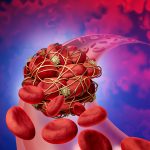-
Improving Glioblastoma Treatment
Phase I clinical trial finds adding a radiosensitizer may improve radiation’s ability to kill this fast-growing brain cancer.
by Thomas Celona
-
Quality of Life Across the Lifespan
As more people diagnosed with and treated for cancer live years beyond treatment, researchers look for ways to improve quality of life.
by Kevin McLaughlin
-
Results That Matter
Cancer medications granted accelerated approval are often confirmed despite not demonstrating a benefit in overall survival or quality of life.
by Eric Fitzsimmons
-
Genetic Testing for Women With Breast Cancer
New recommendations clarify when women diagnosed with breast cancer should be offered genetic testing for inherited cancer risk.
by Laura Gesualdi-Gilmore
-
TIL Therapy Amplifies the Immune System’s Attack on Melanoma
The recently approved immunotherapy Amtagvi uses a patient’s own immune cells to destroy advanced melanoma.
by Sandra Gordon
-
Facts and Stats
Breast Cancer Survival Rates Continue to RiseNew report highlights decades of progress, as well as a persisting disparity.
by Thomas Celona
-
Taking a Shot Against Cancer Recurrences
Early findings on therapeutic vaccines suggest they can delay or stop cancer from returning after tumors are surgically removed.
by Kendall K. Morgan
-
Forward Look
Preventing Blood ClotsMedical oncologist Michael B. Streiff discusses new guidelines to reduce the risk of life-threatening blood clots.
by Ashley P. Taylor
-
Forward Look
The Late Effects of Childhood CancerAlmost all childhood cancer survivors will develop significant health problems related to their treatment by age 45.
by Suzanne McBride
-
Forward Look
Non-surgical Options in Bladder CancerSome people with muscle-invasive cancer can forgo bladder removal surgery.
by Darcy Lewis
Cancer Talk
At-home Prostate Cancer Test May Help Some Men Avoid Biopsy
The test, which analyzes urine for 18 cancer-specific genes, ruled out the need for biopsy in men with elevated PSA without a digital rectal exam.
by Sandra Gordon
The Power of ComedyIn a new play, the pain of cancer can be a chance to laugh.
by Ashley P. Taylor
Melanoma Risk in Childhood Cancer SurvivorsPeople treated for childhood cancer found to have twice the risk of developing melanoma as an adult.
by Cameron Walker
Online Second OpinionsMore than half of patients who participated in a program offering online second opinions were recommended a change to their treatment plan.
by Eric Fitzsimmons















